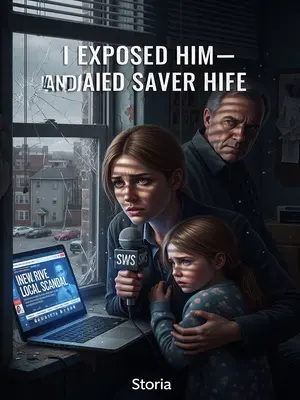Chapter 2: Raising a Wolf
I grew up in a family of teachers. My parents were respected, we were middle-class, comfortable, and I was taught to be kind, so I never learned to be wary.
Our house was filled with books, lesson plans, and the smell of black coffee. We believed in helping others, in giving back. My parents were the kind who volunteered at soup kitchens on Thanksgiving, who baked cookies for new neighbors. I never learned to lock my doors until it was too late.
In high school, I joined a service trip to rural Appalachia, to learn gratitude and see how others lived.
That trip was supposed to be eye-opening, a rite of passage for privileged kids like me. We loaded up a school bus with canned food and blankets, drove hours into the mountains, and spent a week painting houses and handing out backpacks. It felt good to help, to see the difference we could make.
The school encouraged us to pair up with kids from struggling families as “mentorship buddies.”
They called it "Buddies for Life." The idea was simple: bridge the gap, build a friendship, maybe even change someone’s future. We were supposed to be role models, big siblings, a lifeline.
You could donate money to help them cover tuition, or send care packages—school supplies, clothes, whatever they needed.
I remember packing boxes with notebooks and colored pencils, tucking in handwritten notes about college dreams and never giving up. It felt like sending hope in a cardboard box.
It felt meaningful, so I threw myself into it.
I wanted to make a difference. I wanted to believe I could help someone the way my teachers had helped me. Maybe I was a little too eager, a little too trusting.
That’s how I met Eric Morales.
He was two years younger, skin tanned from working outside, with a grin that lit up his whole face. When he smiled, you couldn’t help but notice his white teeth.
He had that kind of charm that made people want to root for him. He was quick with a joke, quick to say thank you. He seemed grateful for everything, even the smallest kindness.
I became his mentor and sent him care packages, encouragement, whatever I could. He worked hard, his grades kept improving.
Every time he sent me an update—an A on a test, a new part-time job—I felt proud. Like I was helping to rewrite his story. My parents were proud too. "You’re doing good, Alyssa," my mom would say.
The year Eric took his SATs, I was a sophomore in college.
I remember him calling me from a payphone outside the library, voice shaking with nerves. He asked for advice, for encouragement. I told him he could do it, that I believed in him.
"Alyssa, I want to go to the same university as you."
"Then keep working at it!"
I mailed him all my notes and practice books for the SATs. I really hoped he could change his life with an education.
I even wrote little sticky notes of encouragement in the margins. I wanted him to know someone was rooting for him. I never once thought of him as anything more than a kid who needed a chance.
I had no idea. Raising a snake, inviting disaster. I had no idea.
That’s the thing about hindsight—it’s always 20/20. If I’d known what was coming, I would’ve run the other way. But back then, I just wanted to help.
He got into my school, just like he’d dreamed.
He called me, screaming with joy. I remember crying happy tears, thinking this was what mentorship was all about. I told everyone I knew—Eric made it. He really made it.
That summer, after his senior year, he came to the city for the first time, saying he wanted to work and save up for tuition.
He was so excited—like a kid at Disneyland. He’d never been to a city bigger than Lexington. Everything was new, overwhelming, and a little scary. I promised to help him find his footing.
I got him a tutoring gig, and he made $1,200 in two months.
He couldn’t believe it. He showed me the cash, counted it over and over. I took him out for burgers to celebrate, and he talked about sending money home, how his mom cried on the phone when she heard the amount.
He told me it was more money than he’d ever seen in his life. His parents would have to work a year and a half to make that much.
He kept saying, "I’ll never go back to being poor. Never." There was a look in his eyes I hadn’t seen before—a sharp, hungry glint that made me uneasy, even then.
He cried, holding the cash. Said he’d never go back to being poor again.
I hugged him, tried to reassure him. "You’re going places, Eric. This is just the beginning."
If things had ended there, it could have been a beautiful story. A city girl helps a small-town boy make it to college, and he lifts his family out of poverty, gives back, inspires others…













